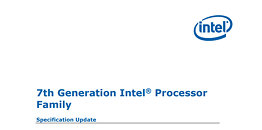Monday, July 17th 2017

Intel Adds New Core CPUs to Its Desktop, Laptop Lineups
Intel has recently updated documentation on their available list of processors based on the 7th generation of the Core Family. These new Kaby Lake-based CPUs will further flesh-out Intel's offerings in both the desktop, laptop, and professional segments with new entries in the Core i3, Kaby Lake-U, and Xeon E3 lines of processors.
The new Core i3 processors make use of the S-0 stepping, instead of the B-0 stepping of previously-released processors. The additions are comprised of the i3-7340 (4.2 GHz, 4 MB cache, 51 W TDP); i3-7320T (3.6 GHz, 4MB cache, 35 W TDP); i3-7120 (4 GHz, 3 MB cache, 51 W TDP); and the i3-7120T (3.5 GHz, 3 MB cache, 35 W TDP.) On the laptop side of the equation, Intel is introducing four new processors: the Core i3-7007U (2 cores, 4 threads, 2.1 GHz, 3 MB cache); the Core i3-7110U (2 cores, 4 threads, 2.6 GHz, 3 MB cache); the Core i5-7210U (2 cores, 4 threads, 2.5 GHz base, 3.3 GHz Turbo, 3 MB cache); and the Core i7-7510U (2 cores, 4 threads, 2.7 GHz base, 3.7 GHz Turbo, 4 MB cache.) Lastly, Intel is adding the new E3-1285 v6 Xeon to its lineup. This one brings increased clock speeds (4.1 GHz base, 4.5 GHz Turbo) with Intel's HD P630 integrated graphics, increasing the TDP by 19 W ( to 91 W) compared to the already existing Xeon E3-1275 v6 - for a 300 MHz clock speed increase. This Xeon should be the new highest-end processor for the iMac, which should place its pricing above the $612 mark previously held by the Xeon E3-1280 v6.
Sources:
Intel, via AnandTech
The new Core i3 processors make use of the S-0 stepping, instead of the B-0 stepping of previously-released processors. The additions are comprised of the i3-7340 (4.2 GHz, 4 MB cache, 51 W TDP); i3-7320T (3.6 GHz, 4MB cache, 35 W TDP); i3-7120 (4 GHz, 3 MB cache, 51 W TDP); and the i3-7120T (3.5 GHz, 3 MB cache, 35 W TDP.) On the laptop side of the equation, Intel is introducing four new processors: the Core i3-7007U (2 cores, 4 threads, 2.1 GHz, 3 MB cache); the Core i3-7110U (2 cores, 4 threads, 2.6 GHz, 3 MB cache); the Core i5-7210U (2 cores, 4 threads, 2.5 GHz base, 3.3 GHz Turbo, 3 MB cache); and the Core i7-7510U (2 cores, 4 threads, 2.7 GHz base, 3.7 GHz Turbo, 4 MB cache.) Lastly, Intel is adding the new E3-1285 v6 Xeon to its lineup. This one brings increased clock speeds (4.1 GHz base, 4.5 GHz Turbo) with Intel's HD P630 integrated graphics, increasing the TDP by 19 W ( to 91 W) compared to the already existing Xeon E3-1275 v6 - for a 300 MHz clock speed increase. This Xeon should be the new highest-end processor for the iMac, which should place its pricing above the $612 mark previously held by the Xeon E3-1280 v6.

53 Comments on Intel Adds New Core CPUs to Its Desktop, Laptop Lineups
www.anandtech.com/show/11544/intel-skylake-ep-vs-amd-epyc-7000-cpu-battle-of-the-decade/7
Secondly, nothing has stopped you from presenting these new CPUs as a table - your text is nigh impossible to read and comprehend.
Thirdly, it's a normal refresh cycle for Intel - these new CPUs are slightly better than the parts they are replacing and cost the same. I don't understand all the bile in the comments section, "staying relevant" and similar shat. Intel is still N1 in the x86 CPU market because it is trusted, known and reliable. Yes, AMD has introduced a lot of nice competitive CPUs but there's thing called inertia and AMD has a long road to fight it successfully.
Just don't tell me is the L3 cache.....
This is Intel just being Intel, and you are approving their politics. Even more, you go further, defending them with marketing statements like "trusted, known and reliable".
Inertia requires movement, but here we still have i7 as dual core. I call this stagnation. Normally, you should ask for more, for progress and evolution.
Think outside of the box, you can do better, you can have more.
To me the x86 market died with Sandy Bridge. 6 years after its introduction we have nothing that's substantially faster (I mean in terms of IPC) than this CPU architecture. And Ryzen has just reached the level of performance that I've already had for six long years. There's very little if any progress or evolution to me.
i3 does not have turbo
i5 has turbo
i7 has a a lot higher turbo frequency
(i7 also has more cache and slightly higher base clock as well.)
Like I said, everyone doesn't need a quad core, everyone isn't a gamer or doesn't edit videos etc., for basic tasks a dual core (even without HT) is still perfectly fine. And like I said, I don't have any problems gaming with 1080p/60 on 2c/4t CPU.
And AFAIK all the mobile CPUs that are not U-models are still quad core.
EDIT: Slizzo beat me to it.
Mobile i7 are still quad-core. Nothing has changed.
The i7-U SKUs have never been quad core.
It's nothing new.